Gaius Julius Caesar: Consul
Gaius Julius Caesar (13 July 100 - 15 March 44 BCE), Roman statesman, general, author, famous for the conquest of Gaul (modern France and Belgium) and his subsequent coup d'état. He changed the Roman republic into a monarchy and laid the foundations of a truly Mediterranean empire.
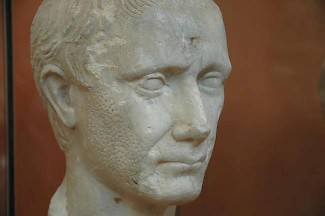
Consul (59)
However, Caesar's consulship was secure, and in december 60 he was elected to the highest office in the Roman republic. His colleague was Bibulus, one of the optimates. Some of the measures Caesar and Bibulus took were the publication of the proceedings of the Senate, a reorganization of the taxes, and a law against extortion. However, the two consuls were not on speaking terms, and at a certain moment Caesar drove his partner from the Forum. Next day, Bibulus is said to have complained in the Senate, but Caesar's armed bodyguard made sure that no one dared to support the poor consul.
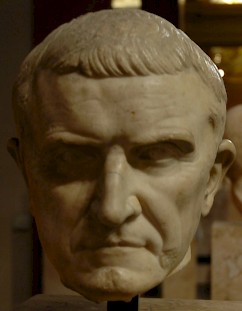
The report about this incident may be exaggerated. However, it is certain that Caesar was more influential than his colleague; people joked that this seemed to be the year of the consuls Julius and Caesar. Other acts were equally illegal: when the conservative Cato protested to one of Caesar's proposals, Caesar had him dragged from the Senate's building and taken off to prison.
Usually, the senate (i.e., the optimates) assigned a province to each consul, where they were supposed to fight wars. Since Caesar's opponents were afraid of him, the senators took care that provinces of the smallest importance would be assigned to him; they could not run the risk of letting Caesar secure a province involving the command of an army.
Caesar counteracted by forming the First Triumvirate, or, to use the more adequate term that was coined by the historian Titus Livy (59 BCE - 17 CE), a conspiracy against the state by its three leading citizens. The other two citizens implied in the conspiracy were the rich banker Marcus Licinius Crassus and the generalissimo Gnaeus Pompeius, better known as Pompey.
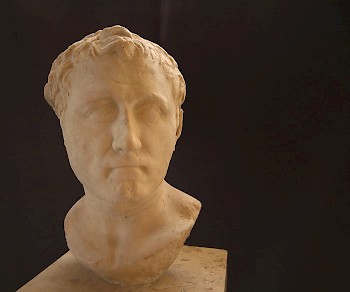
Crassus (115-53 BCE) had started as a colonel in Sulla's army, and had been able to make lots of money under his regime. In 71, as praetor, Crassus had suppressed the slave revolt of Spartacus. Later, he had somehow been involved in the Catiline conspiracies. Caesar had already paid back his debt to Crassus, but still had some moral obligation to the man who had secured his profitable Spanish command.
Pompey (106-48 BCE) was Rome's leading general. He had started his career in Sulla's army, had later suppressed a rising of followers of Marius in Hispania and had co-operated with Crassus in finishing off Spartacus' revolt. Later, he had defeated the pirates, and after 66 he was given Lucullus' command against Mithridates of Pontus. Pompey had defeated the king of Pontus decisively and had forced him to commit suicide; after this, Pompey had annexed Syria and invaded Palestine, where he had captured Jerusalem. His soldiers called him "Pompey the Great", and rightly so: he had doubled Rome's annual income and added vast territories to the empire. In 62, Pompey had returned, and was at odds with the Senate because of its tardiness in ratifying his organization of the East (text).
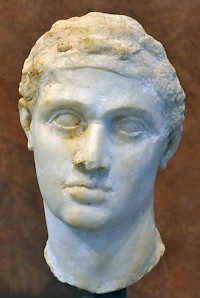
The triumvirate gave something to all of its members. In the first place, the three men decided that no step should be taken in public affairs which did not suit any of the conspirators; together, they would run the republic. The deal was sealed by intermarriage: Pompey married Caesar's daughter Julia (which seems to have been a happy marriage); Caesar married Calpurnia, whose father Piso was a close friend of Crassus. Consul Caesar saw to the swift ratification of Pompey's oriental acts. An agrarian law passed the Senate, distributing land among the urban poor and Pompey's soldiers.
Another important affair was the visit of king Ptolemy XII Auletes, who had been driven away from his kingdom Egypt and wanted Roman support. He reached his goal by a payment of no less than 6,000 talents to Caesar and Pompey. One of the members of his embassy was (probably) his ten-year old daughter, Cleopatra.
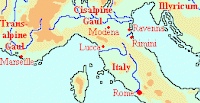
Most important was a law on the provincial commands, which gave Caesar the provinces Cisalpine Gaul (i.e., the plains along the river Po), Illyricum (the Dalmatian coast), and Transalpine Gaul (the Provence) for the years 58-54. In these provinces, there were four legions. (A legion was an army unit of some 4,800 heavily armed, professional infantrymen.) Protected by his office as proconsul and by these troops, Caesar would be safe against his enemies.
Early in 58, Caesar left Rome; his father-in-law Piso, who was consul, took care of his affairs in the capital.